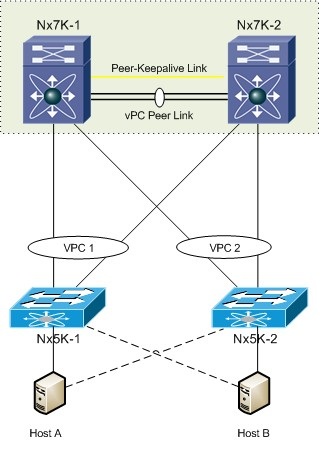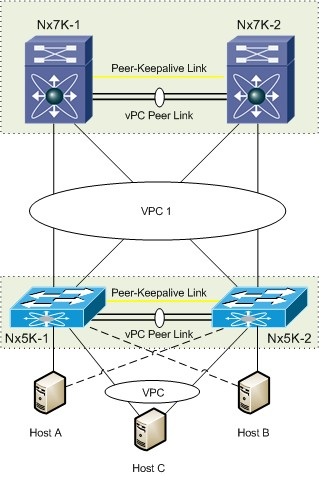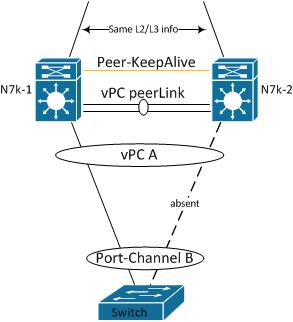- Cisco Community
- Technology and Support
- Networking
- Networking Knowledge Base
- Single-sided vs double-sided vpc
- Subscribe to RSS Feed
- Mark as New
- Mark as Read
- Bookmark
- Subscribe
- Printer Friendly Page
- Report Inappropriate Content
- Subscribe to RSS Feed
- Mark as New
- Mark as Read
- Bookmark
- Subscribe
- Printer Friendly Page
- Report Inappropriate Content
11-29-2011 01:47 AM - edited 03-01-2019 04:45 PM
Introduction
This document describes what single-sided and double-sided vPCs are and also discuss their pros and cons.
Description
There are two main topologies available for deploying Nexus 5000 in access layer and Nexus 7000 in aggregation-layer. These are:
- Single-sided vPC: In single-sided vPCs, each Nexus 5000 switch connects to a pair of Nexus 7000 aggregation switches using a unique vPC, but the Nexus 5000 switches do not run vPC themselves. Each access switch sees its uplink as a simple port-channel, and has no knowledge of vPC.
- Double-sided vPC: In double-sided vPC both the Nexus 7000 and Nexus 5000 switches run vPC. Each vPC pair of Nexus 5000 switches is connected to the aggregation vPC pair using a unique vPC.
Network Diagram
Single-sided vPC:

Double-sided vPC:

Pros and Cons
Single-Sided vPC | Double-Sided vPC | |
Pros | Simple topology with consistent, predictable traffic flows to and from servers. | Supports vPC connection to servers, enabling resiience and load-sharing over multiple NICs. Supports active/active. vPC peer-link provides extra resilience. |
Cons | No capability for vPC to server. Resilient server connection options are limited to active/standby NIC teaming or transmit load-balancing. | Sub-optimal path for 50% of traffic to non-vPC-attached servers. All multicast traffic is copied across vPC peer-link, which can become a bottleneck in high-volume multicast cases. |
Related Information
- Mark as Read
- Mark as New
- Bookmark
- Permalink
- Report Inappropriate Content
Hi.
I have such question:
"If today I have only one link from downstream switch to vPC domain. Could I use vPC on this scheme? Could I add redundancy in the future and not now? Is there any L2 or L3 blackholing? Does aggregation earn on Nexus 7K Switches?"

Thanks.
Good day.
---
Sergey
- Mark as Read
- Mark as New
- Bookmark
- Permalink
- Report Inappropriate Content
It's not recommended design, but it's possible.
Basically you need to have similar config on both peers, situation will look like one of your links failed.
There shouldn't be any blackholing because traffic received on n7k-2 will be send to n7k-1 and then to downstream device. In sucha cases rule where traffic cannot be sent over vpc if it was received from peerlink is not applied.
HTH,
Alex
- Mark as Read
- Mark as New
- Bookmark
- Permalink
- Report Inappropriate Content
Hi, Oleksandr!
Thanks for Your answer.
---
Sergey
- Mark as Read
- Mark as New
- Bookmark
- Permalink
- Report Inappropriate Content
Thanks Oleksandr, for replying!
- Mark as Read
- Mark as New
- Bookmark
- Permalink
- Report Inappropriate Content
Hello,
in a double sided topology scenario, how should we deal with non vPC vlan? Is it nececessary to remove them on both vPCs or just in the bottom one(between N5Ks)
Is there any consideration to take account of?
In real world scenarios, how do you usually implement non-vPC vlans?
- Mark as Read
- Mark as New
- Bookmark
- Permalink
- Report Inappropriate Content
Hi,
Can we deploy just 2 x VPC member link between N5K layer and N7K layer in double-sided VPC design?
In short, N5K-1 just link to N7K-1 and N5K-2 just link to N7K-2. Is it allowed design?
Tks
Leon
- Mark as Read
- Mark as New
- Bookmark
- Permalink
- Report Inappropriate Content
Possible dual sided vPC in fabricpath vpc+?
- Mark as Read
- Mark as New
- Bookmark
- Permalink
- Report Inappropriate Content
Yes, this is possible.
If one of the Links fails, the traffic will be switched through the VPC Peer-Link.
It's not recommended to have Data traffic over the Peer-Link, but if it's only under failure conditions that's fine.
- Mark as Read
- Mark as New
- Bookmark
- Permalink
- Report Inappropriate Content
This is possible, however under what circumstances do you want to do this?
Between the FabricPath Spine and FabricPath Leaf you're no longer running VPC.
This is now a FabricPath Link and no VPC is configured there anymore.
VPC+ is suppoed to be on your FabricPath Leaf/Edge, which should be toward End-Host devices or to switches that don't support FabricPath, in which case they probably don't support VPC either.
- Mark as Read
- Mark as New
- Bookmark
- Permalink
- Report Inappropriate Content
Thanks Henry.
Suppose the setup is currently a double sided vPC,
2xN7K
2xN5K
then I want to migrate it to fabricpath with vPC+. So then from the SPINE that is configured as vPC I will have to remove those vPC configuration? So only from SPINE to LEAF will not have any vPC but just the FP core ports correct?
From LEAF that's where the vPC+ will be configured...
What will happen if all the Layer 3 routing (HSRP) next hop of all the downstream devices is configured on the N7K? Will there be any special configuration for that?
- Mark as Read
- Mark as New
- Bookmark
- Permalink
- Report Inappropriate Content
Hi Belray,
I hope I can explain this sufficiently.
You'll need to remove the VPC config off the Interfaces connecting from the 7K Spine to the 5K Leaf and configure them as "Switchport mode FabricPath". You'll however keep the Global VPC config on the Leaf, just with a FabricPath Switch-ID included (This makes it VPC+. Also remember the Spanning-tree pseudo-information).
e.g. Below:
vpc domain 1
peer-keepalive destination 1.1.1.2 source 1.1.1.1 vrf vpc_HB
peer-gateway
fabricpath switch-id 1001
spanning-tree vlan 1-1000 priority 4096
spanning-tree pseudo-information
vlan 1-1000 root priority 4096
The Layer3 will remain on the 7k's as it is now. The only difference is that the Layer2 Vlan will be configured as mode fabricpath.
vlan 3
mode fabricpath
name Management
Hope this helps.
- Mark as Read
- Mark as New
- Bookmark
- Permalink
- Report Inappropriate Content
Hi Henry,
Thanks! I got it. So once I remove those vPC config from N7K and retain the (HSRP as the routing point of my downstream) then I should be good. This LEAF switches is the demarcation of the STP and does not extend the STP up to SPINES correct?
For the HSRP config on my N7K do I need to add or modify some config or I will leave it as it is?
- Mark as Read
- Mark as New
- Bookmark
- Permalink
- Report Inappropriate Content
If the SPINE will not have any vPC configuration then the HSRP configs are still there then will there be any duplicates?
- Mark as Read
- Mark as New
- Bookmark
- Permalink
- Report Inappropriate Content
Or maybe I will retain the vPC configs on N7Ks but a vPC+ so that the control plane will still be sync to avoid duplicates? Thoughts?
- Mark as Read
- Mark as New
- Bookmark
- Permalink
- Report Inappropriate Content
Hi again,
Yes, the HSRP config stays the same.
You could leave the VPC config as it would make it simpler to migrate. It would also allow both Core switches to act as Gateway's for traffic routed out of your Cores.
You're also correct regarding the Leaf switches being the STP demarcation for South Bound hosts/devices. All traffic gets switched through FabricPath with ECMP (Equal Cost Multi Path) to the Leaf/Edge.
Find answers to your questions by entering keywords or phrases in the Search bar above. New here? Use these resources to familiarize yourself with the community:


